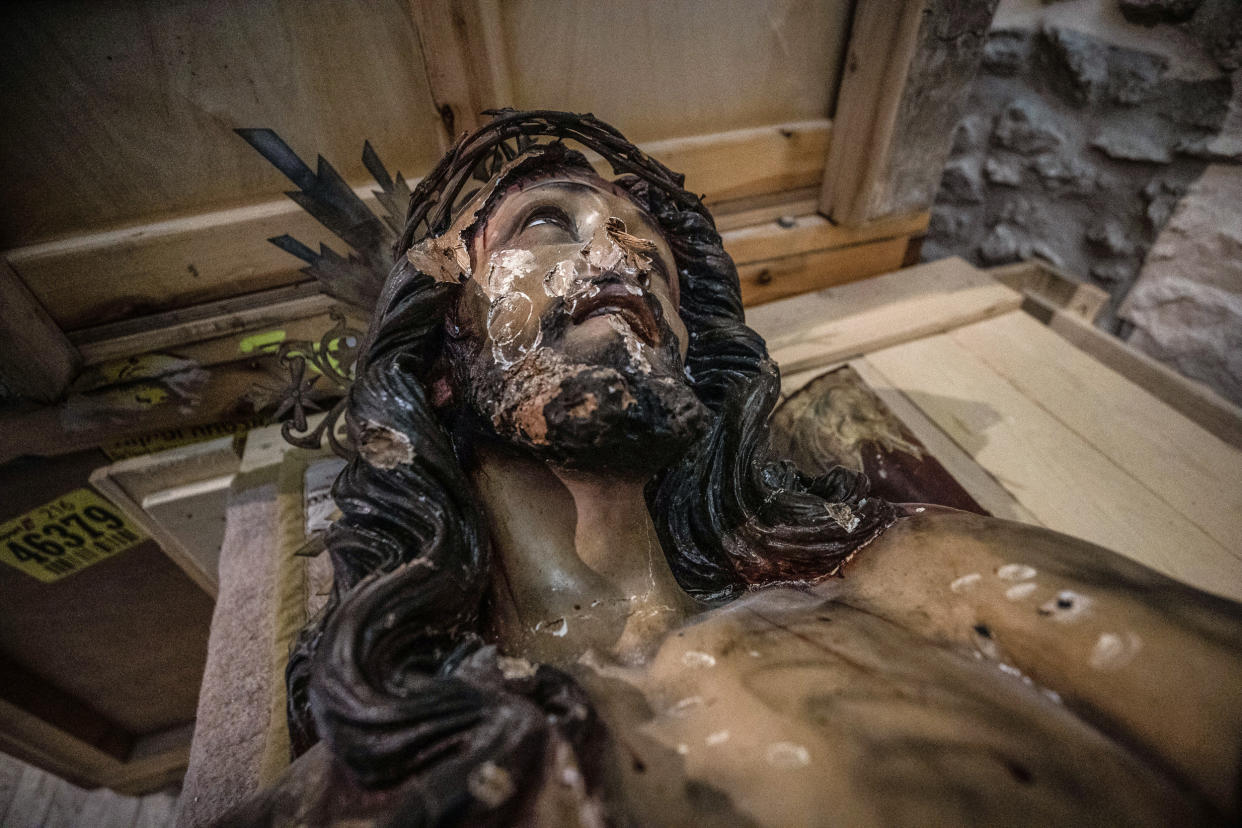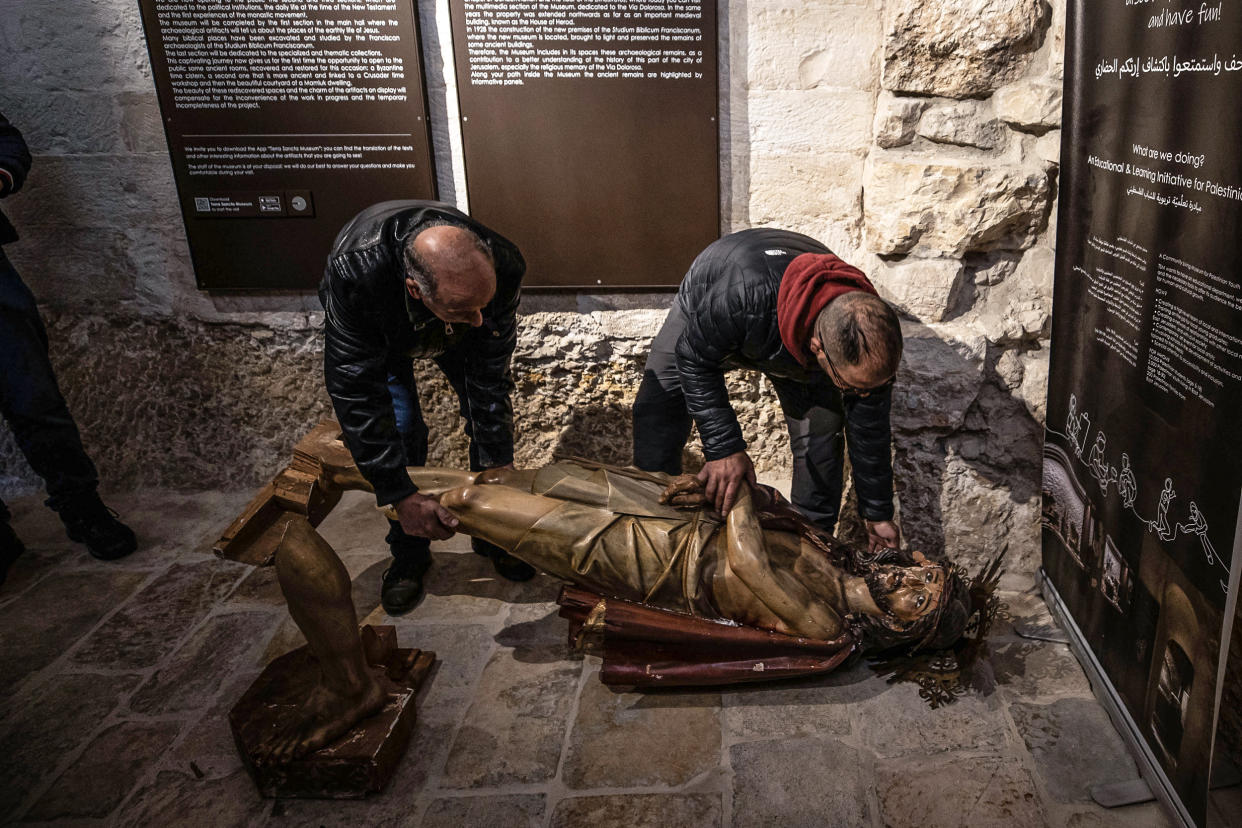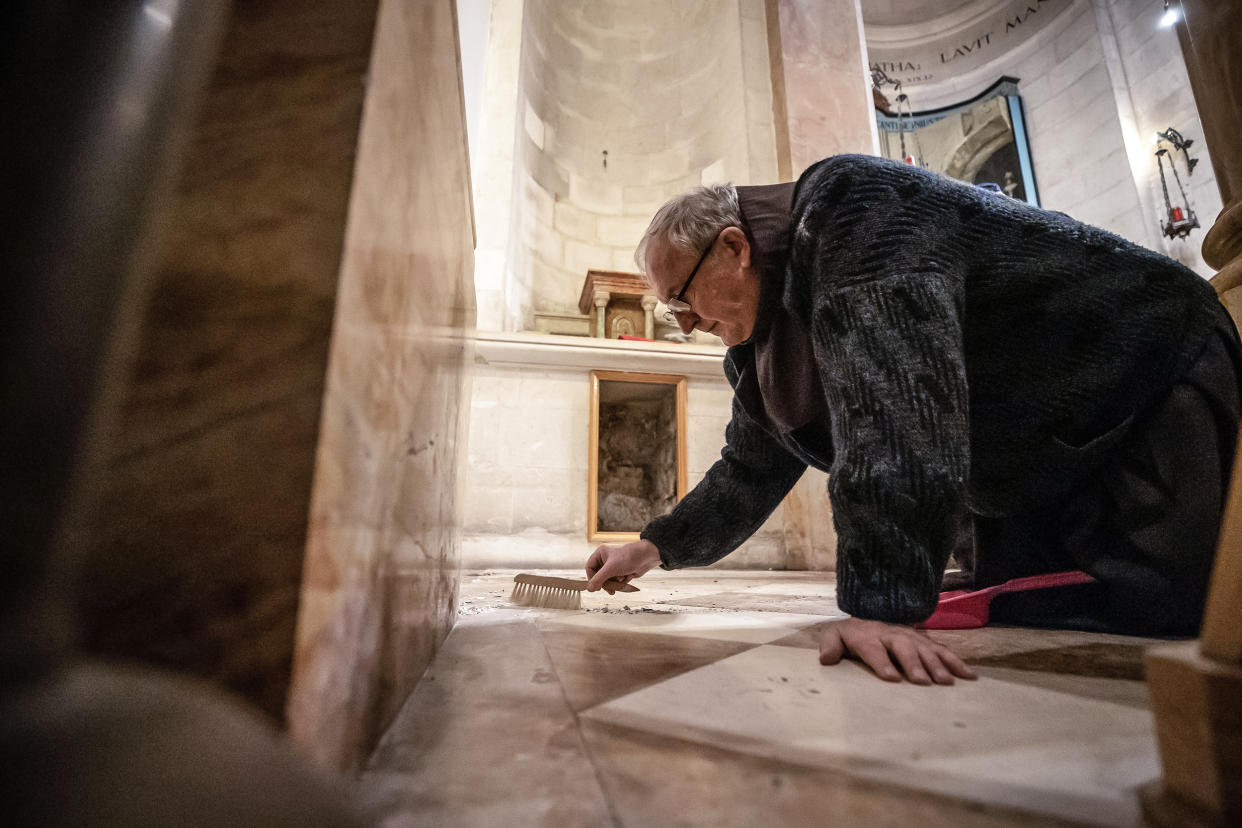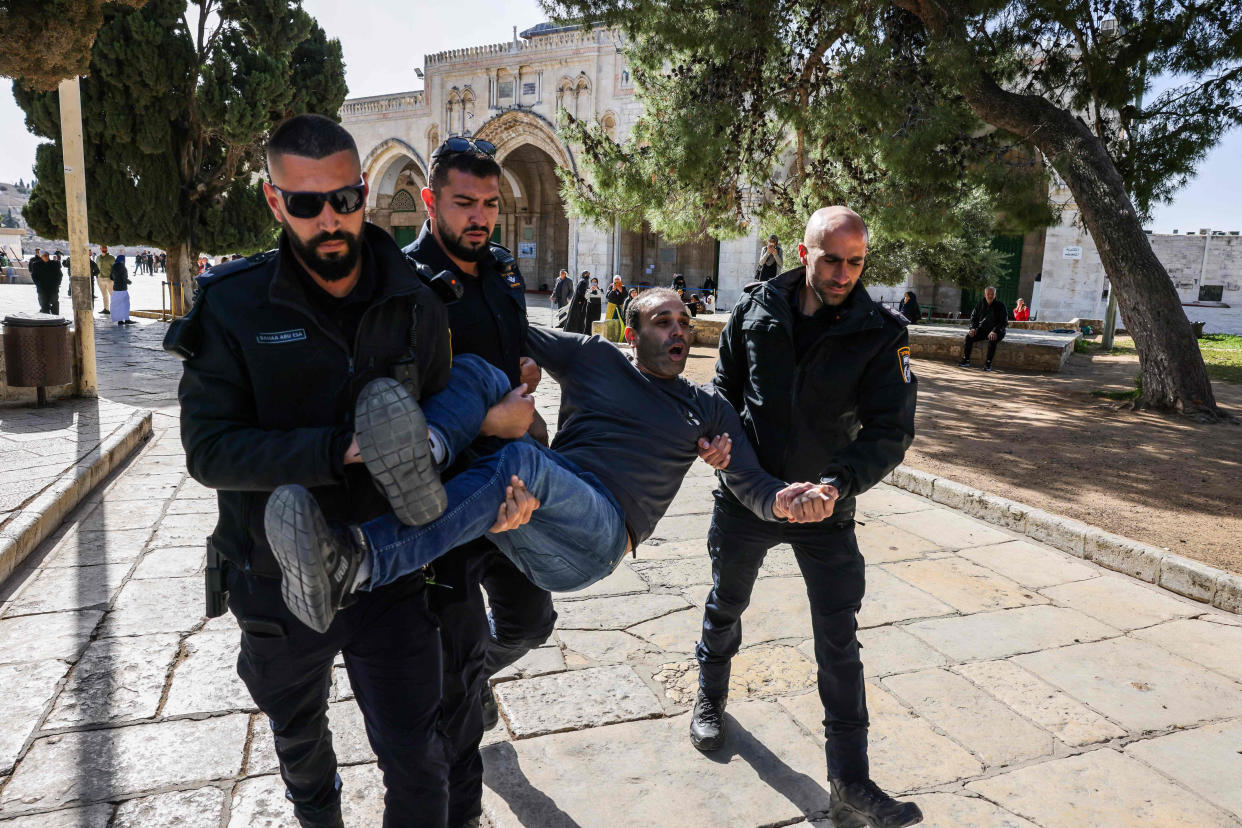Christians in the Holy Land become a target of Israel's rising far right
JERUSALEM — Upstairs in his monastery tucked in the Old City, Brother Matteo Munari heard a commotion at the Church of the Flagellation, along the path where Jesus is said to have carried his cross on the way to his crucifixion.
Munari, 49, went downstairs and found that a 10-foot statue of Jesus had been wrested off its pedestal and thrown to the ground, its face partially destroyed. When the church’s doorman tackled the man suspected of toppling the statue on Feb. 2, Jewish ritual tassels that had been concealed under his clothes emerged, the Franciscan friar said.
“He was kind of crying. Like, ‘We have to destroy all the statues and the idols in Jerusalem,’” Munari told NBC News last week as he gazed at the smashed face of Jesus, now awaiting repair at the church, which was built in 1929 on a site that dates to the 12th century.
“I just felt sad for him,” he added. “I think he wanted to do the right thing. So the problem probably was not the man himself, but who instructed him to think in this violent way.”
Israeli police confirmed that a U.S. citizen in his 40s was arrested at the scene, adding that investigators were “working diligently to maintain security, order and freedom of worship for members of all religions and denominations.”


But church officials and Christian leaders in Israel say this was far from an isolated incident. As tensions over Jewish and Muslim holy sites have erupted in recent weeks, spiraling into violence between Israelis and Palestinians, Christians in the Holy Land say they’re under attack, too.
Although they blame a minority of Jewish extremists for the attacks, they say Israel’s far-right government has fostered a culture of impunity for attacks on non-Jews, emboldening the nation’s most extreme elements.
In January, ultra-Orthodox Jewish lawmakers allied with Prime Minister Benjamin Netanyahu proposed imposing jail time for Christian proselytizing, although after a global outcry, Netanyahu said he would block the bill.
Dimitri Diliani, head of the Palestinian National Christian Coalition, said he felt “more threatened” now by “Israeli policies than any other time.”
“Staying here and protecting our heritage is becoming more difficult,” he said.
In Christianity’s holiest city, churches have been graffitied and clergy who live and work here report being frequently spit on, harassed and even physically attacked by extremist Jews. Christian leaders say most incidents are never thoroughly investigated.
Exact numbers for anti-Christian incidents are hard to come by. But data compiled by Tag Meir, a Jewish group that opposes racism and violence against Israel’s minorities, suggest that there has been a dramatic rise in attacks by Jewish civilians on cemeteries, churches, monasteries and mosques in Israel and the occupied West Bank. The group has documented six such incidents in the first three months of 2023 alone, compared to just two in all of 2022 and three in 2021.

The Israeli government says its commitment to ensuring that people of all faiths can live and worship safely is a core democratic value, pointing out that Israel’s founding documents enshrine freedom of religion to all “by law and in practice.”
And the national Israel police force says that it is in “continuous contact” with religious leaders to investigate attacks and vandalism and that efforts to bring lawbreakers to justice are “unwavering.”
“As the police of all residents and visitors to Jerusalem — Jews, Muslims and Christians — we act against violence and acts of vandalism, and in particular those that hurt religious sentiments,” Jerusalem District Police Commander Doron Turgeman said during a recent meeting with the Greek Orthodox patriarch of Jerusalem, Theophilos III.
In the knotty patchwork of identities and beliefs that make up Israel’s social fabric, the plight of Christians has at times been overshadowed by the overlapping struggles between Muslims and Jews, and Israelis and Palestinians.
Many, but not all, Christians in Israel and the West Bank are Palestinian. Christian Palestinians themselves are a minority compared to the larger Palestinian population that adheres to Islam.

Often, it’s tensions surrounding Muslim and Jewish holy sites that have garnered the most global attention, including in the recent violent flare-ups in Israel and along its borders that erupted in response to Israeli police raids this month on the Al-Aqsa Mosque compound, the third-holiest site in Islam. The same spot is also the holiest site in Judaism, known to Jews as the Temple Mount.
Those raids elicited retaliatory rocket attacks by Palestinian-linked groups in the Gaza Strip, Lebanon and Syria, with Israel in turn retaliating by striking those territories.
Yet Christian holy sites in the Old City have also become flashpoints, most recently on Saturday at the Church of the Holy Sepulchre, where many Christians believe Jesus was crucified, just a third of a mile from Al-Aqsa Mosque and the Western Wall.
In the narrow, cobbled alleyways of the Christian Quarter, tens of thousands of pilgrims from around the world showed up for the Holy Fire miracle ceremony, an annual ritual held the day before Orthodox Easter. The crowd was far larger than the 1,800 worshippers the Israeli police had announced would be allowed into the church, leading to sometimes-violent clashes with officers.

In a war of words that escalated as the ceremony approached, church officials accused Israeli police of arbitrarily restricting worship to a mere fraction of the number who safely attended in years past, calling it a crackdown on the freedom to worship. Police argued the restrictions were about fire hazards and stampede risks, insisting that they were relying on an engineer’s analysis of how many could safely fit in the church.
“The tensions we understand, because everybody wants to partake in this special event,” police spokesman Dean Elsdunne said Saturday in the Church of the Holy Sepulchre’s courtyard. “We’re here ultimately to ensure that the people who got the permission from the church leaders are able to attend and attend safely.”
Overlooking the Old City less than a mile away, Propst Joachim Lenz walked the grassy pathways of the Protestant cemetery on the steep slopes of Mount Zion, where tradition holds the Last Supper took place. Many of the tombstones in the historic cemetery bear dates from the 1800s, but now many are broken, tipped over and trashed.
In January, security camera footage revealed two young men, both wearing traditional clothing associated with Orthodox Jews, breaking into the cemetery and desecrating the headstones. Israeli police said 28 graves were vandalized, and a 14-year-old and an 18-year-old were later arrested and indicted on vandalism charges.
“We do not have the feeling that the government is really helpful to end this violence, to stop these aggressions against people who just do not have the same faith as those attackers,” said Lenz, the head of the German Lutheran Church in Israel.
Bearing witness a few feet away, Gadi Gvaryahu from Tag Meir agreed. The Jewish group pays condolence visits to victims of extremism, and Gvaryahu said that while Jewish extremists have long enjoyed a degree of impunity, with like-minded politicians in power, “now they feel better.”
“It’s like shooting in the heart of Judaism,” said Gvaryahu, before heading home before sunset to observe the Jewish sabbath. “This is not our faith. It’s not written in the Bible. We should all condemn those extremists. And we first as Jews need to condemn.”
